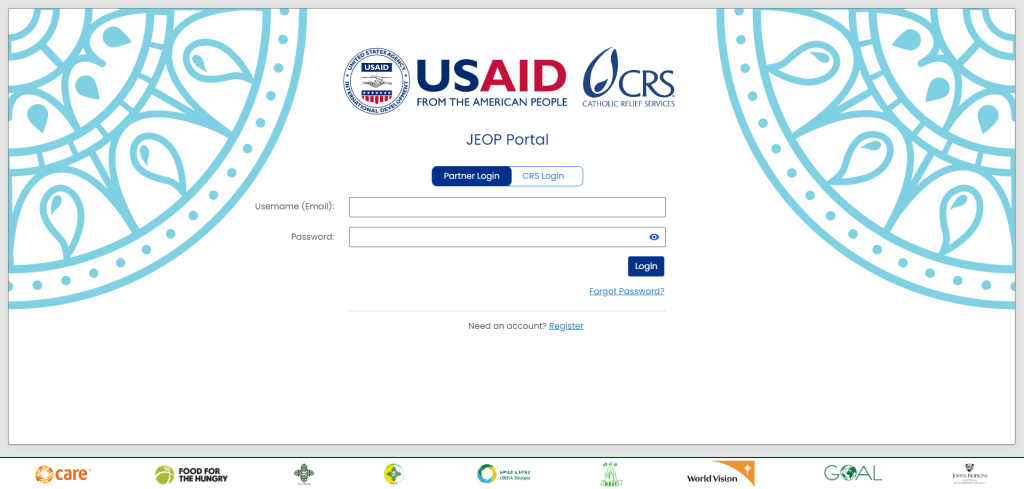On This Page

Project Overview
Project Balance has been working with Catholic Relief Services since 2016 to provide information technology and data management services for their Joint Emergency Operations (JEOP) food monitoring program. JEOP is an emergency food distribution program targeting transitory or acute food insecure households and provides assistance to over 2 million Ethiopians monthly. With the assistance of 9 on-the-ground local partners, commodities and cash are distributed across over 70 districts through approximately 600 local distribution points. The program has significant operational and monitoring requirements, relying on timely and accurate data collection and analysis. Project Balance was engaged to assist CRS to digitize the operation, moving away from paper and Excel spreadsheet data collection and analysis tools to an integrated and automated electronic system.
Solution
The product vision statement highlighted the availability of centralized, timely, secure, and high-quality information available to partners and CRS to improve operational efficiencies. The solution needed to work in occasionally connected environments, and users would have varying degrees of computer and mobile literacy. Similarly, the system needed to be able to adapt to changes on the ground in terms of locations served, commodities distributed, and other programming changes from CRS or the donor.
The system includes many different modules to improve accountability, ensure compliance, reduce risk, and shift staff focus from manual data collection and cleaning to project improvement and adaptive management. These modules include:
- Participant registration
- Analyzing household survey data to generate lists of eligible households to receive food or cash
- Allocation of commodities and cash to districts
- Data collection of beneficiaries’ identifying information and actual commodities received at distribution points
- Photo capture app that allows for the recall of previously captured photos for a household head, written to integrate with CommCare
- Commodity tracking into and out of warehouses (from regional warehouses to distribution points)
- Compliance and risk monitoring
- Assessment for physical warehouse condition, records management, internal partner monitoring, distributions, end use checks, market and mills, complaints, and incidents
- Action planning to address deficits
- Report verification
- Early warning system
- Monitoring, Evaluation, Accountability, and Learning (MEAL)
- Post distribution monitoring
- Track training objectives and participant information
- Comprehensive data warehouse that holds clean and organized information; used for operations management, monitoring, and evaluation
- User administration across all platforms
- Master data management
- Ensure spelling consistency across systems
- Maintain linkages of geographic and other information across systems
Technology Stack
Specialization
The JEOP system is able to work as one comprehensive solution due to tight integration between the .NET application and CommCare, and requires all components to use the master data lists through the Master Data Management feature of the portal. Project Balance, with buy-in from Dimagi, updated the CommCare programming interface (API) in two areas: 1) to include organizational structure updates and 2) to add, update, or disable mobile workers’ profiles. These updates were needed to ensure consistency across the system, including in both the portal and CommCare. It also allows administrators to manage mobile users from within the Portal, including specifying each CommCare data collection app with a specific security configuration.
Reference or master data, which includes the geographic locations within Ethiopia (region, zone, woreda, kebele, warehouses), partner names and commodities, and all of the allowable linkages between these entities, must be used throughout the application and CommCare apps. The Master Data Management module allows for portal administrators to add new and update existing location spellings and linkages, as well as properly disable a location. Not only is data quality significantly increased by requiring all components of the system to use the master tables, but the time required to reconcile name matching and linkages is dramatically reduced. Without master data alignment, reporting could not be easily accomplished.
There is a wide variety of user roles required to effectively use and administer the JEOP portal. These roles span both CRS and partners and include user and master data managers at the system level, overseen by CRS and data analysts, commodity distributors, warehouse storekeepers, monitoring and evaluation resources, and program managers. The training requirement is significant because there are hundreds of specific roles that continually need to be trained across the country. In addition, distribution locations can shift month-to-month, making training more complex. Different training approaches were tested, leading to short, targeted “training of trainers” sessions with on-site training of data collectors.




